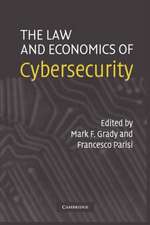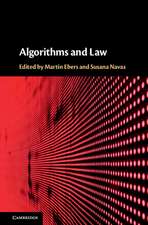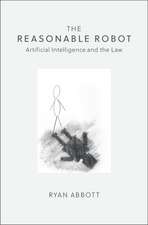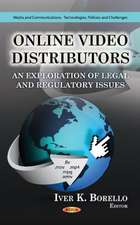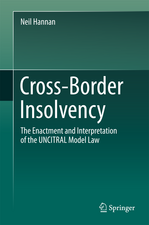The Cambridge Handbook of Smart Contracts, Blockchain Technology and Digital Platforms: Cambridge Law Handbooks
Editat de Larry A. DiMatteo, Michel Cannarsa, Cristina Poncibòen Limba Engleză Hardback – 9 oct 2019
| Toate formatele și edițiile | Preț | Express |
|---|---|---|
| Paperback (1) | 215.25 lei 43-57 zile | |
| Cambridge University Press – 29 mar 2023 | 215.25 lei 43-57 zile | |
| Hardback (1) | 1263.60 lei 43-57 zile | |
| Cambridge University Press – 9 oct 2019 | 1263.60 lei 43-57 zile |
Din seria Cambridge Law Handbooks
- 23%
 Preț: 1141.69 lei
Preț: 1141.69 lei - 23%
 Preț: 1305.60 lei
Preț: 1305.60 lei - 20%
 Preț: 198.47 lei
Preț: 198.47 lei -
 Preț: 232.94 lei
Preț: 232.94 lei -
 Preț: 304.01 lei
Preț: 304.01 lei -
 Preț: 251.21 lei
Preț: 251.21 lei -
 Preț: 299.93 lei
Preț: 299.93 lei - 14%
 Preț: 1392.39 lei
Preț: 1392.39 lei -
 Preț: 281.73 lei
Preț: 281.73 lei - 14%
 Preț: 1082.10 lei
Preț: 1082.10 lei - 23%
 Preț: 1385.33 lei
Preț: 1385.33 lei - 23%
 Preț: 1051.30 lei
Preț: 1051.30 lei - 14%
 Preț: 1285.56 lei
Preț: 1285.56 lei - 23%
 Preț: 1139.30 lei
Preț: 1139.30 lei - 23%
 Preț: 1162.90 lei
Preț: 1162.90 lei - 23%
 Preț: 1109.50 lei
Preț: 1109.50 lei - 23%
 Preț: 1177.27 lei
Preț: 1177.27 lei - 20%
 Preț: 1216.58 lei
Preț: 1216.58 lei - 23%
 Preț: 1062.18 lei
Preț: 1062.18 lei - 23%
 Preț: 860.96 lei
Preț: 860.96 lei -
 Preț: 331.33 lei
Preț: 331.33 lei -
 Preț: 468.73 lei
Preț: 468.73 lei - 14%
 Preț: 873.12 lei
Preț: 873.12 lei - 23%
 Preț: 1221.80 lei
Preț: 1221.80 lei -
 Preț: 305.05 lei
Preț: 305.05 lei - 23%
 Preț: 1296.11 lei
Preț: 1296.11 lei - 23%
 Preț: 1365.80 lei
Preț: 1365.80 lei - 23%
 Preț: 1403.54 lei
Preț: 1403.54 lei -
 Preț: 534.56 lei
Preț: 534.56 lei -
 Preț: 357.37 lei
Preț: 357.37 lei - 23%
 Preț: 1069.73 lei
Preț: 1069.73 lei - 23%
 Preț: 1248.43 lei
Preț: 1248.43 lei -
 Preț: 399.90 lei
Preț: 399.90 lei - 14%
 Preț: 872.72 lei
Preț: 872.72 lei - 23%
 Preț: 1111.56 lei
Preț: 1111.56 lei - 23%
 Preț: 1479.50 lei
Preț: 1479.50 lei - 23%
 Preț: 1097.31 lei
Preț: 1097.31 lei -
 Preț: 393.60 lei
Preț: 393.60 lei -
 Preț: 442.21 lei
Preț: 442.21 lei -
 Preț: 215.25 lei
Preț: 215.25 lei - 23%
 Preț: 1133.08 lei
Preț: 1133.08 lei
Preț: 1263.60 lei
Preț vechi: 1641.05 lei
-23% Nou
241.85€ • 249.24$ • 204.18£
Carte tipărită la comandă
Livrare economică 03-17 martie
Specificații
ISBN-10: 1108492568
Pagini: 386
Ilustrații: 2 b/w illus.
Dimensiuni: 183 x 261 x 25 mm
Greutate: 0.89 kg
Editura: Cambridge University Press
Colecția Cambridge University Press
Seria Cambridge Law Handbooks
Locul publicării:New York, United States
Cuprins
Preface; Part I. General Framework: Legal and Technical: 1. Smart contracts and contract law Larry A. DiMatteo, Michel Cannarsa and Cristina Poncibò; 2. Legal meaning of smart contracts Riccardo De Caria; 3. Technology of smart contracts Valentina Gatteschi, Fabrizio Lamberti and Claudio Demartini; Part II. Contract Law and Smart Contracts: 4. Contract formation Mateja Durovic and André Janssen; 5. Challenges of smart contracts: implementing excuses Eric Tjong Tjin Tai; 6. Contract interpretation Michel Cannarsa; 7. Smart contracts and contractual remedies Larry A. DiMatteo and Cristina Poncibò; Part III. Electronic Platforms and Networks: 8. Digital platforms: regulation and liability in EU law Piotr Tereszkiewicz; 9. Blockchains: a technology for decentralized marketplaces Eliza Mik; 10. Regulating smart contracts and online platforms: a Chinese perspective Jia Wang and Lei Chen; Part IV. Privacy, Security, and Data Protection: 11. Blockchain and data protection Lokke Moerel; 12. Data protection law in hybrid worlds Sjef van Erp; 13. Smart contracts: issues of property and security rights Louis-Daniel Muka Tshibende; 14. Algorithmic contracts and consumer privacy Lauren Henry Scholz; Part V. Smart Contracts: Courts and the Legal Profession: 15. Smart contracts and the courts Marc Clément; 16. Usefulness and dangers of smart contracts in consumer transactions Oscar Borgogno; Part VI. Future of Smart Contracts, Blockchain and Artificial Intelligence: 17. Transactional technologies, legal disruption, and the case of network contracts Roger Brownsword; 18. Observations on the impact of technology on contract law Barbara Pasa and Larry A. DiMatteo; 19. Visions of smart contracts Diana Wallis.
Recenzii
Descriere
The product of a unique collaboration between academic scholars, legal practitioners, and technology experts, this Handbook is the first of its kind to analyze the ongoing evolution of smart contracts, based upon blockchain technology, from the perspective of existing legal frameworks - namely, contract law. The book's coverage ranges across many areas of smart contracts and electronic or digital platforms to illuminate the impact of new, and often disruptive, technologies on the law. With a mix of scholarly commentary and practical application, chapter authors provide expert insights on the core issues involving the use of smart contracts, concluding that smart contracts cannot supplant contract law and the courts, but leaving open the question of whether there is a need for specialized regulations to prevent abuse. This book should be read by anyone interested in the disruptive effect of new technologies on the law generally, and contract law in particular.





